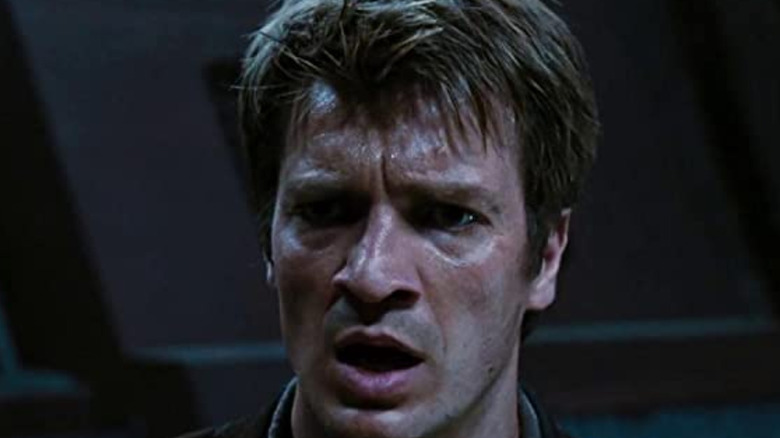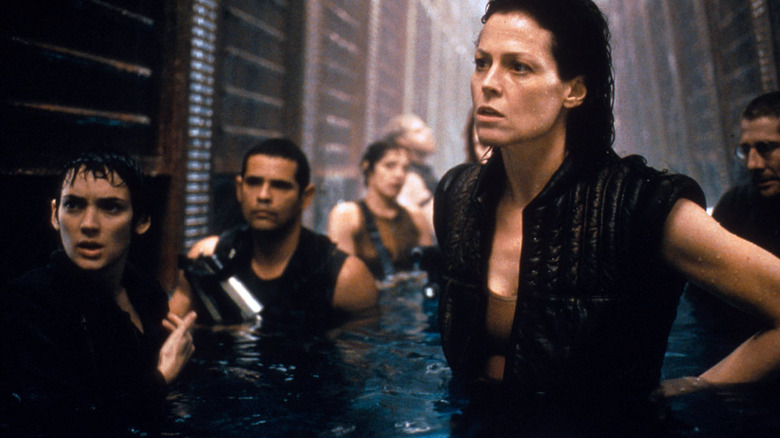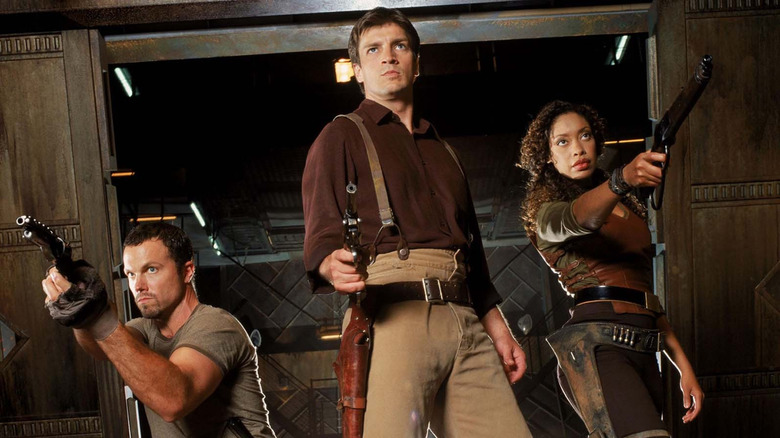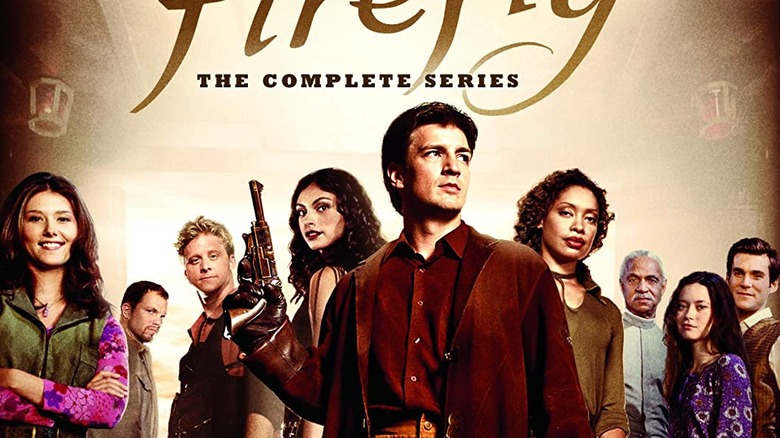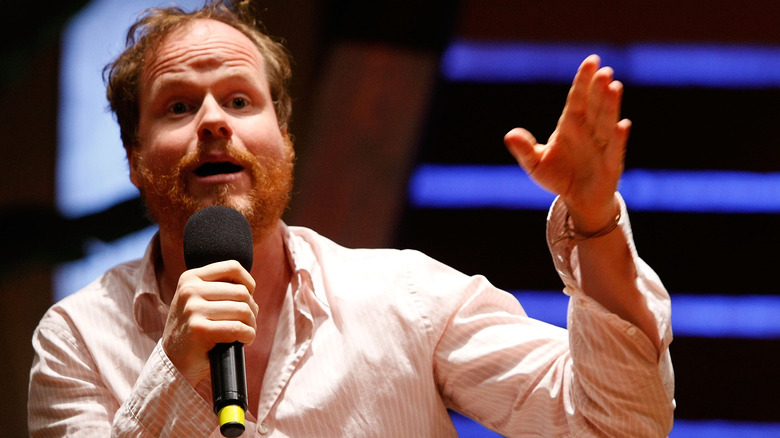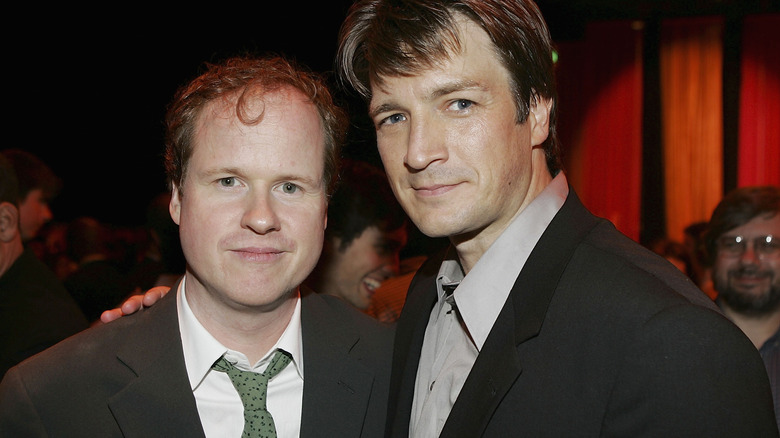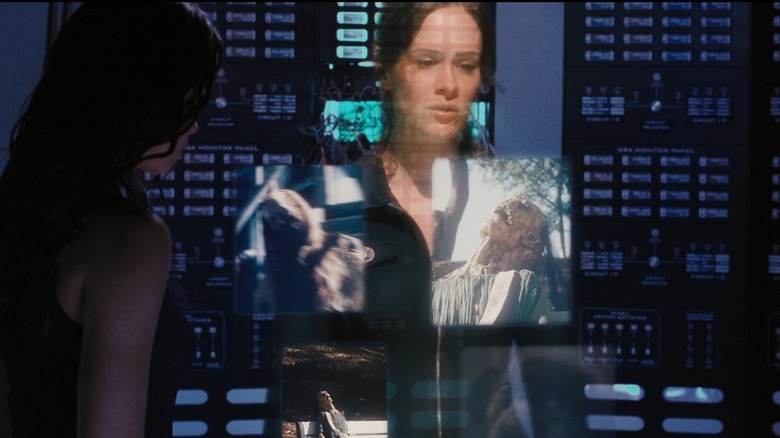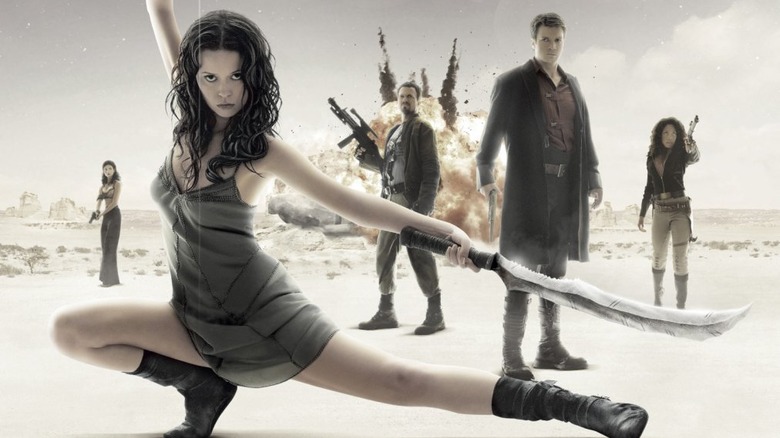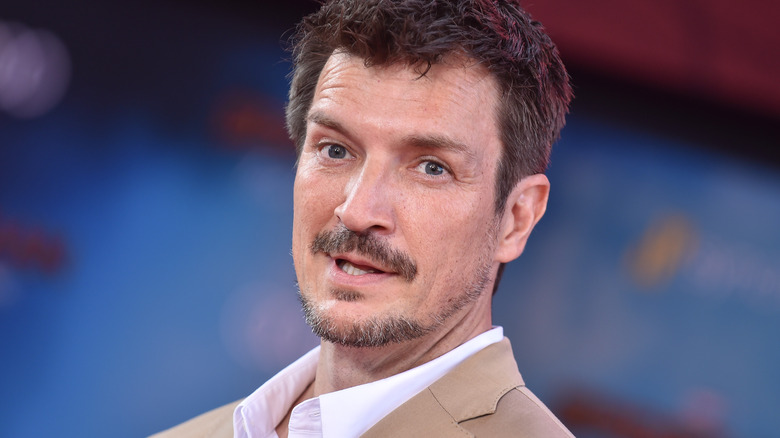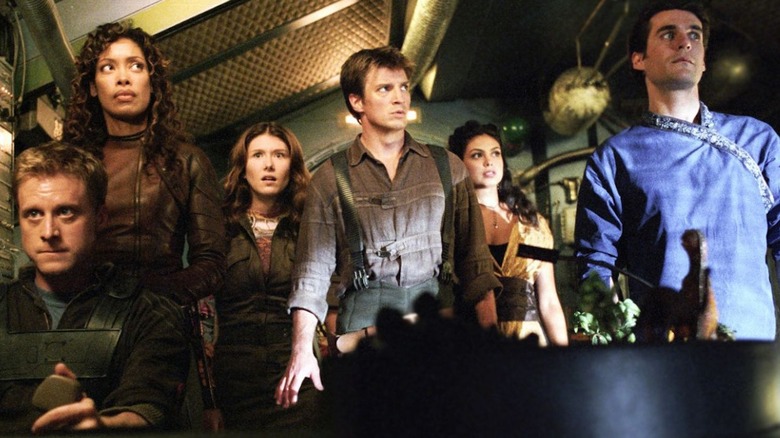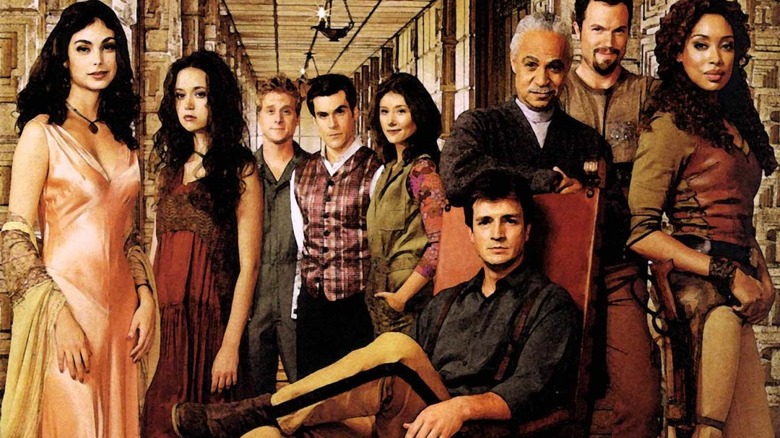The Untold Truth Of Serenity
We may receive a commission on purchases made from links.
"Firefly" — a show about space cowboys in the year 2517 — premiered on the Fox Network during the fall of 2002. It was cancelled after only 11 of its 14 completed episodes aired in America. Then via DVDs, illegal downloads, and eventually streaming platforms, "Firefly" emerged as one of the most influential and acclaimed sci-fi/fantasy series in television history.
Do you know how many other TV shows that didn't finish a single season 20 years ago have an Honest Trailer? The answer is zero. "Firefly" is the only one.
The crew of The Serenity — which is a Firefly-class spaceship, hence the title — took a unique journey into our hearts and eyeballs, but that only matches the one-of-a-kind nature of the program itself.
The plot of the franchise revolves around Captain Malcom Reynolds (Nathan Fillion), veteran of an intergalactic civil war in which his side did not prevail. He and his crew of lovable miscreants scrape by as smugglers and providers of miscellaneous black-market services, and then one day they encounter fugitive siblings River and Simon Tam (Summer Glau, Sean Maher), who are on the run from The Alliance — the prevailing faction from the aforementioned civil war.
After Fox pulled the plug, a perceived opportunity to capitalize on fan outrage prompted Universal Pictures and "Firefly" creator Joss Whedon to convert the show into a big screen endeavor. The result is 2005's "Serenity," a movie based on a TV show that — if judged only by Nielsen ratings and ignoring every other metric of value — was already a proven failure. Looking back on one of the most curious films to ever hit the big screen, here are some untold truths about "Serenity."
"Serenity" was not Joss Whedon's first space cowboy movie
Long before his name became synonymous with questionable behind-the-scenes behavior, and years ahead of his rise to prominence as the creator of "Buffy The Vampire Slayer," Joss Whedon was a workaday Hollywood screenwriter.
He penned a few "Roseanne episodes," a few episodes of the original "Parenthood," and got his big break on the writing team for the bona fide kids' classic "Toy Story" (1995). Whedon then shifted his focus to writing sci-fi with "Alien: Resurrection" (1997) — the fourth installment of the intergalactic horror franchise, in which series protagonist Ellen Ripley (Sigourney Weaver) encountered a crew of space mercenaries bearing more than a passing resemblance to the "Firefly" gang.
Casually chauvinistic good-hearted tough guy Johner (Ron Perlman); grizzled, irreverent ship captain Elgyn (Michael Wincott); and the physically unintimidating, conspicuously quiet, recently-hired assistant engineer Call (Wynona Ryder) respectively fit the same character paradigms as Jayne Cobb (Adam Baldwin), Malcom Reynolds, and River Tam. While there's not a one-to-one comparison between the "Resurrection" gang and the Serenity crew, let's say Malcom and his associates are kind of like Buffy, whereas Elgyn and his bunch are kind of like Faith.
It all just goes to show that "Firefly" existed in Whedon's imagination way before the early 2000s.
Fans fought for more "Firefly" before there was a Snyder Cut
In some ways, the real world story of "Firefly" and "Serenity" hinges on the technological acceleration of their era. Social media was in its infancy of relevancy in 2002; but that didn't stop Whedon's very online fanbase from getting loudly perturbed about Fox canning their new favorite show.
As Facebook wouldn't be invented for a few more years, "Firefly" fans — nicknamed Browncoats, in homage to the Independent Planets Army from the show's mythology — had to rely on digital message boards and forums to vent their indignation.
Quoted in i news, Whedon biographer Amy Pascale says, "I believe it was one of the first [instances] where the producers reached out and asked fans for their help [to save the show]." The source notes that similar online campaigns eventually rose up in attempts to reverse the cancellations of CBS's "Jericho" and NBC's "Community." Over the years, fan backlash rightly or wrongly directed at film and TV studios expanded into a potentially terrifying force of its own — personified in the campaign for and actuality of "Zack Snyder's Justice League" (2021), a new edit of "Justice League" (2017), which had credited Whedon as its primary director.
Ironically, online fan rage became relevant in the entertainment industry because folks wanted more of Joss Whedon's work, and its biggest moment came at the hands of folks who wanted his work replaced with someone else's.
DVD sales made a "Firefly" movie seem profitable, in theory
Angry ranting on the internet is well and good; but on its own, it wasn't enough to convince movie studios and producers that "Firefly" had a large enough audience to support it on a new network. You couldn't find evidence of "Firefly" doing strong numbers on Hulu, either, because there was no Hulu — streaming television barely existed in the 2000s.
But DVD sales were one quantifiable metric that could gauge the popularity of any movie or TV show. Upon its release, "Firefly: The Complete Series" — which helpfully included the three episodes that never made it to air in the U.S. — crashed through the 200,000 units-sold ceiling pretty quickly, according to a 2005 SF Gate report. An IGN article from around the same time states that Amazon burned through its supply of "Firefly" DVDs on preorders before they were officially available for purchase.
For a series that was poorly promoted, aired in the wrong order, frequently preempted, and axed after about four months, that's quite a lot of box sets. The comparatively surprising retail boom established a perception that "Firefly" contained untapped potential as a franchise in some form.
"Serenity" was Joss Whedon's first time directing ... a movie
While he came to the table with more than 30 episodes of directed television to his name, the cinematic follow-up to "Firefly" marks Whedon's debut as a major motion picture director, some 15 years into his emergence as an active Hollywood creative professional. Even after "Serenity," he didn't direct another movie until "The Avengers" (2012).
So in 2013, Joss Whedon had directed three films: the comparatively low-budget cult film "Serenity," the highest-grossing movie of all time, and "Much Ado About Nothing" (2012) — a zero-budget Shakespeare adaptation he made at his house with actor buddies for a lark. Dude's had a weird career.
Of course, Whedon also wrote "Serenity," describing the process as an usually challenging endeavor.
"I'm basically serving two masters" he said in an IGN interview in 2003. "I want to tell a mythic and exciting and timeless tale about nine people that [the audience has] never met, and yet not betray or repeat anything I do on the series. It's going to be tough."
As far as fan and critical consensus goes, it looks like he pulled it off.
People told Whedon that shooting "Serenity" in L.A. for $40 million was insane
Although films reaching for the same visual scope "Serenity" targeted typically cost north of $100 million to make in those days, Universal encouraged Whedon to locate production in a cheaper country to keep costs down.
In defiance of such conventional wisdom (and possessing a lack of desire to move his very young children out of the country for three months), Whedon insisted on shooting in his home city — earning him some good press and goodwill from the Los Angeles community. Somehow, he reportedly delivered "Serenity" to the studio for less than $40 million.
Whedon's other demand was that the original cast return to their formerly-TV roles, which wasn't a problem, as the Universal executives overseeing the project took an if-it's-not-broke approach to the "Serenity" roster of actors. Nathan Fillion's job, most assuredly, was safe as heck.
It has since been revealed that Alan Tudyk's inability to sign on for a contractually-mandated optional sequel is partially to blame for Wash's tragic fate. Knowing what we know now, that makes the end of his story extra sad — without a "Serenity sequel," Wash died for nothing.
Sarah Paulson pops up as one of The Reavers earliest victims
As a scientist who reveals The Alliance inadvertently created the ultra-violent race of ex-humans known as Reavers — directly and indirectly murdering millions in the process — Dr. Caron (Sarah Paulson) brings about a plot twist that transcends this particular movie to impact the entire franchise mythos. So, despite appearing onscreen for less than two minutes before dying horribly, Dr. Caron is an extremely important "Serenity" character.
This isn't quite an unknown background extra going on to become a major Hollywood commodity; Paulson was already well established among the ranks of TV and film actors before she landed this brief but highly-memorable part in "Serenity." But Ryan Murphy had yet to come into fruition, and therefore Paulson was not yet able to star in virtually every Ryan Murphy-related project, nor had she achieved her current movie star status. So, although "Serenity" doesn't quite feature Sarah Paulson before she got famous, she definitely secured a key "Serenity" moment during her on-the-way-up phase.
The box office failure made Fox executives look smart
The folks in charge of determining what did and did not stay on the Fox Network in the late '90s and early 2000s don't exactly have a spotless track record. Cancelling "Family Guy" after its first pair of seasons is the most glaring example of their questionable competence; but they also canned "Arrested Development" and "Futurama" — two other programs now considered classic comedy staples.
If "Serenity" had panned out as a cinematic juggernaut, spawned a string of sequels, and turned the cast into bona fide movie stars, Fox executives would've had to face up to how hard they botched the "Firefly" rollout. Instead, "Serenity" failed to surpass the $40 million mark — so, after you factor in its promotional costs, "Serenity" was a net negative for Universal.
For reasons totally independent of its quality, "Serenity" simply didn't click with mainstream moviegoers. So if the Fox execs thought "Firefly" would be wildly beloved by a sci-fi fringe, but never attract enough viewers to justify spending at least a million dollars per episode to keep it on network TV, "Serenity" ticket stubs confirmed their suspicions.
While Seth MacFarlane made Fox execs look clueless, Joss Whedon made it appear as though they knew what they were doing.
A fan tried to raise $300 million and give it to Nathan Fillion
Doing press to promote "Firefly" reruns on basic cable back in 2011, Nathan Fillion mentioned to EW, "If I got $300 million from the California Lottery, the first thing I would do is buy the rights to "Firefly," make it on my own, and distribute it on the Internet." He did not assume anyone would take that statement literally or seriously. He assumed poorly.
As it turned out, many people took him literally and seriously, and an online fund-raising campaign to buy "Firefly" and give it to Nathan Fillion promptly sprouted legs and started jogging.
Fillion himself had to tell folks to power down. "Would I want to do ["Firefly"] again? Yes. Do I want people sending in money? No," he explained in a follow-up article published not long thereafter.
This all transpired not quite 10 years after "Firefly" and six years after "Serenity," making it another testament to the longevity of the franchise's appeal. However, if Fillion attempted to buy "Firefly" today, he'd be dealing with the Disney Corporation instead of Fox — and from what we can tell, Disney never sells intellectual properties; they just buy more.
The franchise tanked, but helped everyone's careers
If we can judge the success of a TV show and/or movie by the jobs its cast scrounge up after the fact, then "Firefly" and "Serenity" did better than their ratings and box office returns might indicate.
After eight seasons in the titular role of "Castle" — by conventional metrics, technically his most successful TV show — Nathan Fillion landed a starring role in "The Rookie." Gina Torres went on to join the cast of "Suits," and guest starred on "Westworld," "Riverdale," and "Hannibal," among other TV shows. Alan Tudyk voiced K-2SO in "Rogue One: A Star Wars Story" (2016), and routinely provides voice acting and/or onscreen cameos for other high profile sci-fi/superhero/nerd stuff. Morena Baccarin showed up in TV shows like "Homeland" and "Gotham," and was the female lead in "Deadpool" — arguably the most surprising superhero smash of the last decade. Roughly five years after appearing in a pair of episodes as Malcom's unlikely and temporary wife Saffron, Christina Hendricks broke through on TV screens in the guise of Joan Harris on "Mad Men."
Some may argue "Firefly" is more influential than "Castle." Others may even argue that "Firefly" will age better than "Deadpool." But if you want to argue that "Firefly" was a bigger deal than "Mad Men," well, be prepared to have yourself laughed out of that room.
'Firefly' is not scheduled to return ... and that's good?
Of course there's some idle, noncommittal executive chat about a "Firefly" relaunch. But as of this writing, there are no announcements or credible rumors indicating an imminent return of The Serenity to any screens, be they big or small. This might be for the best.
In the eyes of some, the show's legacy may have benefited from its abbreviated run. As Nathan Fillion himself mused in a 2015 Esquire article, via SyFy, "'Firefly,' as short-lived as it was, never had an opportunity to suck. It didn't have that, 'Oh, well, Season 2 was kind of slow. It picked up in Season 3 and Season 4 was great.'"
If it didn't get an opportunity to suck in 2002, why should it now?
With Hollywood endlessly rebooting, relaunching, and rehashing any established property it thinks is worth another penny, maybe the Big Streaming Nostalgia Machine really doesn't need to frack 10 more episodes of "Firefly" out of Joss Whedon. Twenty years further into their careers, the original cast might be expensive and difficult to schedule. Also, if fans have learned anything from the final seasons of "Arrested Development" and "The X-Files," it's that more isn't always better.
"Firefly" fans got 14 episodes and a movie. Maybe that's plenty.
